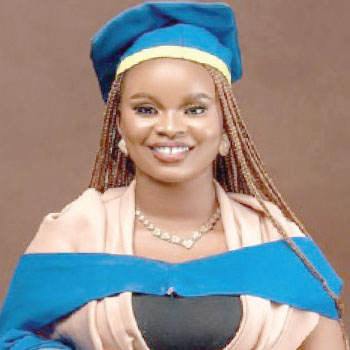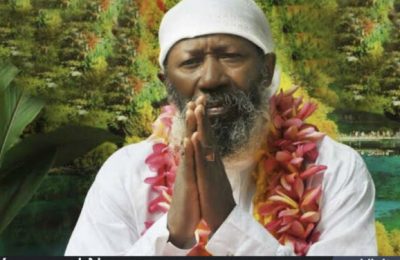
Peace Ewor is the best-graduating student of the Department of Computer Science, Rivers State University. She graduated with a First Class in the 2022 – 2023 session with a Cumulative Grade Point Average (CGPA) of 4.58. She was also the best-graduating student in the Department of Computer Science during her OND programme in 2017 at the Ken Saro-Wiwa Polytechnic, Bori, Rivers State. In this interview by Kingsley Alumona, she speaks about her academic journey and other issues.
In 2017, you were the best-graduating student in the OND programme at the Ken Saro-Wiwa Polytechnic, Bori, Rivers State. Why did you choose a polytechnic then over a university? And how did the course you studied there impact your subsequent education and career?

A polytechnic was not my first choice. I initially applied to study Petrochemical Engineering at Rivers State University in 2014 but was admitted to a different course due to my WAEC grade. I retook the West African Examination Council (WAEC) exam and the Unified Tertiary Matriculation Examination (UTME) in 2015 but missed the admission due to withheld results, leading me to Ken Saro-Wiwa Polytechnic for Computer Science.
The course I studied had a profound impact on my subsequent education and career. Studying Computer Science gave me a solid foundation in logical thinking, problem-solving, and technical skills. These skills are crucial in my field as a UI/UX designer, where understanding how systems work and how users interact with them is essential. The hands-on experience and practical approach of the polytechnic education prepared me well for real-world challenges. It also instilled in me a passion for technology and innovation, which continues to drive my career forward.
Additionally, being recognized as the best-graduating student from the Department of Computer Science after my OND programme boosted my confidence and opened doors to further opportunities. It validated my decision to pursue Computer Science and reassured me that I was on the right path.
This achievement also motivated me to continue learning and growing in my field, leading me to take on more complex projects and eventually specialise in UI/UX design.
How would you describe the practical teaching you received while studying computer science at RSU?
Yes, my department at Rivers State University met my expectations by providing a well-structured curriculum and dedicated lecturers. Despite resource constraints, we received a solid theoretical grounding in computer science, covering essential topics like algorithms, data structures, and software engineering. Exposure to current programming paradigms and tools also kept us competitive.
Despite all the challenges, how were you able to sustain your first-class grade till graduation?
To sustain a First Class, set clear goals. This aspect made me stay focused because, from the first day in class, I had told myself that I wanted to graduate with an amazing grade, not lower than a First Class. This decision enabled me to manage time efficiently, actively participate in class, use multiple resources, revise consistently, form study groups, seek help when needed, maintain a balanced lifestyle, and stay motivated and adaptable. Consistency and dedication are key to achieving academic success.
What aspect(s) of computer science interested you more as an undergraduate and why?
As an undergraduate, I was drawn to software engineering due to my passion for problem-solving and its transformative potential. I enjoyed the creativity, continuous learning, and real-world applications. The collaborative nature and adaptability across industries made it a compelling field where I could merge technical skills with meaningful impact.
What was the title of your final-year project and what were the major findings from it?
My final-year project, ‘A modern computerised cryptographic system,” focused on designing a system that used modern techniques to enhance data security.
Major findings included the effectiveness of advanced encryption standards (AES) and secure hashing algorithms (SHA-256) in protecting data. The project balanced security with performance, featured a user-friendly interface, and demonstrated scalability, making it suitable for various applications. It also highlighted the educational value of understanding cryptographic principles and the importance of staying updated with advancements in the field.
In the course of your studies, what were the things or situations you think your university or state government could improve on to make life and schooling comfortable for students and staff?
During my studies, I identified several areas where improvements by the university and the state government could significantly enhance the quality of life and education for students and staff.
One of the foremost areas is the investment in ensuring students receive high-quality education. This investment needs to be multifaceted, addressing both the recruitment of competent lecturers and the provision of necessary educational resources.
The recruitment and retention of high-quality lecturers are paramount. The government and the university administration should prioritise hiring educators who are not only knowledgeable in their fields but also passionate about teaching and mentoring students. This could involve offering competitive salaries and benefits to attract and retain talented educators, as well as providing opportunities for professional development and continuous learning. By doing so, lecturers can stay updated with the latest advancements in their disciplines and teaching methodologies, which in turn benefits the students.
Additionally, ensuring that lecturers are delivering quality education should be a continuous process. Regular evaluations and feedback mechanisms can be implemented to assess teaching effectiveness and identify areas for improvement. This can include student evaluations, peer reviews, and performance assessments. Encouraging an environment of accountability and excellence in teaching can lead to a more engaging and effective learning experience for students.
Another critical area for improvement is the provision of necessary equipment and resources. The government and the university should invest in modernising educational infrastructure. This includes updating laboratories with current technology, ensuring computer labs have up-to-date software and hardware, and providing access to high-speed internet. These resources are essential for students to engage in practical learning and research, which are integral components of a comprehensive education in fields like computer science.
As someone who studied at both the polytechnic and university levels, how does the HND certificate/university degree dichotomy make you feel?
The dichotomy is a topic that has elicited mixed feelings among many students and professionals in Nigeria. This separation, where holders of Higher National Diplomas (HND) from polytechnics are often seen as having lower academic standing compared to university degree holders can sometimes create unnecessary division and undervalue the contributions of polytechnic graduates.
From my experience, having studied at a polytechnic and later at a university, I can appreciate the strengths and unique qualities of both educational systems. The polytechnic education provided me with practical skills and a strong technical foundation, while the university education offered a broader theoretical perspective. Both have their merits and contribute valuable skills to the workforce.
The dichotomy often stems from a perception that university degrees are more academically rigorous and that polytechnic education is more focused on vocational training. However, this view overlooks the fact that polytechnics can offer high-quality, specialised training directly applicable to many industries. In fields such as computer science and engineering, the practical skills and hands-on experience gained at a polytechnic can be just as valuable as theoretical knowledge.
If I had the power to address this dichotomy, I would advocate for a more integrated approach that recognises the value of both educational paths. Rather than scrapping the HND/degree distinction, I would propose measures to bridge the gap between them.
The world has gone digital and technology and ICT are making life easier — data is easier to generate and information is easier to access. Unfortunately, many people believe that all these are eroding our morality, physical contact, and humanity. What is your take on this?
The digital revolution enhances connectivity and access to information but raises concerns about reduced physical interactions and the potential erosion of morality. Balancing technology’s benefits with genuine human connections and critical thinking is essential to ensure it enriches rather than detracts from our lives.
Your LinkedIn profile says you are a product designer. What project have you designed lately? Recently, you posted on LinkedIn about an event where you discussed the topic ‘Designing for Usability’. What were the major highlights of the discussion?
I have been working on some amazing projects in healthcare, fintech, and more, with several now on the App Store and Play Store.
At I/O Extended Abakaliki, I discussed ‘Designing for Usability’, focusing on intuitive, accessible design and the importance of iterative testing to enhance user experience.
Since you graduated, what have you been doing or developing yourself? Any plan for postgraduate studies?
Since graduating, I have been focusing on enhancing my digital skills, which have been crucial for my work. Currently, I work as a product designer, both remotely on a full-time basis and as a freelancer on various projects.
In addition to this, I am serving as a corps member in Ebonyi State, where I assist as a lecturer assistant at the state university.
I am eager to pursue my master’s degree. But, right now, I am limited by resources. Once I can sort that out, I will be moving forward with my postgraduate studies.
Where do you see yourself in five years?
In five years, I see myself advancing further in the field of information technology (IT), possibly in a more strategic or leadership role, and contributing significantly to innovative projects.
What is your advice to students aspiring to achieve the kind of academic feat you achieved?
My advice to students is to stay dedicated and committed to their goals. Set clear objectives, utilise available resources, seek help when needed, and engage deeply with your studies. Maintain balance, stay curious, and be adaptable. Regular self-reflection and persistence are key to achieving academic success.
READ ALSO: Suspected ritualist sells human skull, legs for N70,000 in Ibadan







